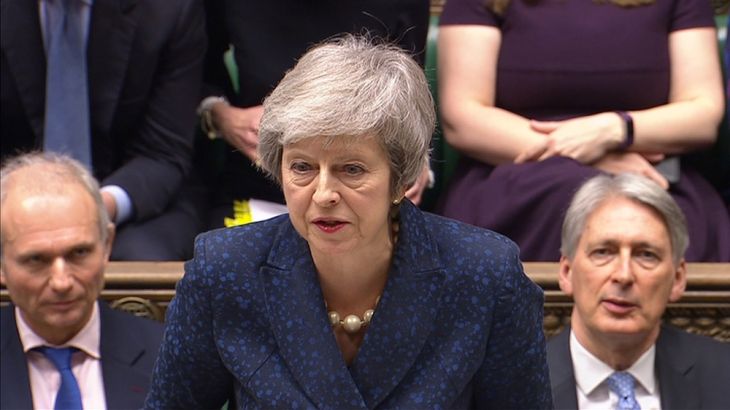UK parliament inflicts fresh defeat on PM May over Brexit
British legislators ramp up pressure on embattled Prime Minister Theresa May ahead of crucial Brexit vote next week.

British legislators have slashed the time Prime Minister Theresa May’s government will have to formulate a plan B if her widely criticised Brexit deal is rejected in a crucial parliamentary vote next week.
Members of Parliament (MPs) in the UK’s lower chamber House of Commons voted 308 to 297 on Wednesday to back a motion demanding the government puts forward a revised plan within three days should May lose the vote on January 15.
Keep reading
list of 4 itemsWhy are British farmers pleading for a universal basic income?
Northern Ireland agreement could end deadlock, restore government
Forced to become British: How Brexit created a new European diaspora
MPs will have the right to amend any second plan brought forward by May, potentially opening the way for several different outcomes, ranging from a so-called “managed no-deal” exit to another referendum.
May, who is struggling to win approval for her Brexit plan, previously had 21 days to report back to the Commons in the event of a defeat next Tuesday.
She pulled a scheduled parliamentary vote on the brokered withdrawal agreement last month, admitting it lacked the required support.
The deal, between the government of the United Kingdom and the European Union, had been struck in November after more than a year of back-and-forth negotiations between London and Brussels.
Parliament ramps up pressure on May
Wednesday’s decision came as MPs began five days of debate on May’s deal and is the latest example of legislators seeking to tie the government’s hands over Brexit, with less than three months to go before the UK leaves the European Union on March 29.
On Tuesday, legislators backed a motion prohibiting ministers from spending on preparations to leave the EU without a deal unless authorised by parliament.
A potentially damaging no-deal exit is the default scenario if May’s deal is rejected, with the UK’s central bank warning that Britain’s gross domestic product (GDP) could shrink by up to eight percent in such a scenario.
The prospect of the UK leaving the bloc with no agreement on the terms of its withdrawal or future trading relations has raised fears over possible supply chain disruptions and blocked ports, prompting companies and the government to ramp up their contingency planning in recent weeks.
Addressing the Commons on Wednesday, May urged MPs to back the withdrawal agreement she negotiated with European counterparts, warning it was the only way to avoid a no-deal departure.
“We’ve put a good deal on the table that protects job and security,” May said, adding that there would be no general election in the event that her plan is rebuffed.
Responding to May’s comments, the leader of the main opposition Labour Party Jeremy Corbyn called on May to “do the right thing” and call a public vote if she fails to get her divorce deal through parliament.
“The Prime Minister has spent the last week begging for warm words from EU leaders and achieved nothing … She’s already squandered millions of pounds of public money on last-minute half-baked planning for a no-deal that was rejected last night,” Corbyn said.
“So if her deal is defeated next week, as I hope and expect it will, will the Prime Minister do the right thing and let the people have a real say and call a general election?” he added.
Simon Usherwood, a reader in politics at the University of Surrey and deputy director of the UK in a Changing Europe group, told Al Jazeera that Wednesday’s events demonstrated the “degree to which the government is not in control of the Commons”.
“The government doesn’t have a reliable majority to push its agenda through and suggests this vote next week is going to be even harder than we already knew it was going to be,” he said.
“It seems clear that May will lose the vote, the only real question is how much does she lose by,” Usherwood added.
Controversial Irish ‘backstop’ clause
Opposition to May’s deal is spread across the political spectrum, including sections of her own ruling Conservative Party and the 10 Northern Irish Democratic Unionist Party (DUP) MPs her government relies on to command a majority in parliament.
The main source of contention is the plan’s safety net “backstop” measure – which would guarantee no hard border is reintroduced on the island of Ireland in the event that post-Brexit trade negotiations between the UK and the bloc prove unsuccessful.
Critics of the backstop argue it could tie the UK into the EU’s orbit indefinitely.
In an effort to assuage MPs concerns, May has lobbied her European counterparts and officials in Brussels to make concessions on the clause.
But EU leaders have refused to budge, insisting that the withdrawal agreement cannot be renegotiated.
They have also made clear the backstop is meant only as a temporary measure of last resort, however.
Agata Gostynska-Jakubowska, a senior research fellow at the Centre for European Reform, said Wednesday’s parliamentary vote would do little to change the mood in Brussels regarding Brexit.
“They [EU leaders] have been pretty clear that negotiations have come to an end,” Gostynska-Jakubowska told Al Jazeera.
“No one on the continent wants a no-deal scenario …but preparations for a possible no-deal Brexit are ongoing on the EU side. The idea is to hope for the best and prepare for the worst,” she added.